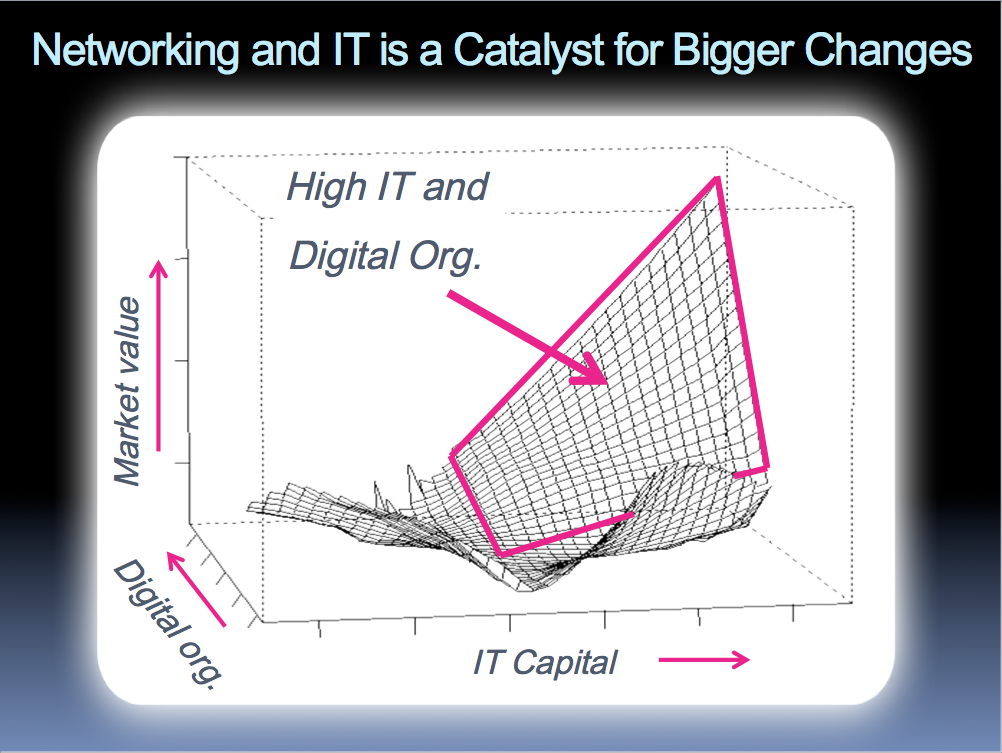February 16, 2012 - Washington, DC Overview and Agenda Photos
The Economic Impact of Information Technology
![]() Download Summary
Download Summary
![]() Download PDF Slides
Download PDF Slides
![]() Download Video
Download Video
Summary

The exponential improvements in the power of digital technologies have been remarkably consistent for over 40 years, but the economic effects of these advances are much larger in recent years. Digitization has led to an acceleration in productivity growth in the U.S. economy overall, and particularly for the companies that use information technology most intensively. The most effective companies have reorganized the way they make decisions, interact with customers and suppliers, and innovate to take advantage of the digital revolution, creating trillions of dollars of intangible organizational assets in the process. Furthermore, the increasing digitization of economic activities has made possible four important trends, each of which has significant implications for innovation:
-
Improved real-time, fine-grained measurement of business activities;
-
Faster and cheaper business experimentation;
-
More widespread and easier sharing of observations and ideas; and
-
The ability to replicate process and product innovations with greater speed and fidelity.
While the net effect of digitization has been to substantially boost productivity and create trillions of dollars of new wealth, not every firm or every person has benefitted equally. The gap between leading firms and laggards in most industries has grown. Meanwhile, income inequality has worsened. The challenge for individuals, companies and policymakers is to adapt their skills, organizations and institutions more quickly to keep up with ever-accelerating digital advances.
Erik Brynjolfsson
 Erik Brynjolfsson is the director of the MIT Center for Digital Business, the Schussel Family Professor at the MIT Sloan School, Research Associate at the National Bureau of Economic Research (NBER), and chairman of the MIT Sloan Management Review. His research examines the effects of information technologies on business strategy, productivity and performance, Internet commerce, pricing models and intangible assets. His recent work examines the social networks revealed by digital information flows, such as email traffic, and their relationships to information worker productivity. Dr. Brynjolfsson is the co-author of Wired for Innovation: How IT is Reshaping the Economy. He has bachelor's and master's degrees from Harvard and a Ph.D. from MIT.
Erik Brynjolfsson is the director of the MIT Center for Digital Business, the Schussel Family Professor at the MIT Sloan School, Research Associate at the National Bureau of Economic Research (NBER), and chairman of the MIT Sloan Management Review. His research examines the effects of information technologies on business strategy, productivity and performance, Internet commerce, pricing models and intangible assets. His recent work examines the social networks revealed by digital information flows, such as email traffic, and their relationships to information worker productivity. Dr. Brynjolfsson is the co-author of Wired for Innovation: How IT is Reshaping the Economy. He has bachelor's and master's degrees from Harvard and a Ph.D. from MIT.
The materials on this webpage, including speakers' slides and videos, are copyright the author(s).
Permission is granted for non-commercial use with credit to the author(s) and the Computing Community Consortium (CCC).


